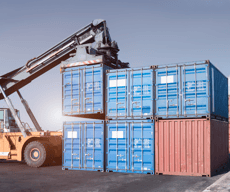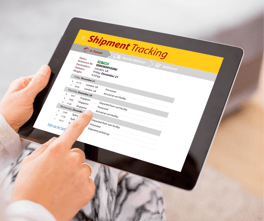Navigating Detention and Demurrage Charges
Business Advice | Logistics | Transportation | Best Practices | Freight Management | Shippers
For many shippers, especially those new to the freight industry or those who only navigate the intricacies of logistics occasionally, it can be tough to keep up with all the lingo and acronyms. Two terms that often cause confusion and, unfortunately, lead to unplanned costs are "detention" and "demurrage."
Today, we're diving deep into these charges, providing insights into their implications, and offering actionable strategies for shippers to avoid them.
Understanding Detention and Demurrage Charges
Detention and demurrage, while both related to extended use of shipping services and equipment beyond allotted times, have distinct differences that shippers should be aware of:
Detention
Detention refers specifically to charges related to the transport equipment. When a truck, trailer, or other form of transport equipment is retained beyond the agreed-upon time frame, detention charges come into play. For instance, if a truck is contracted to be unloaded and returned within 24 hours but is kept for 48 hours, the shipper will incur detention charges for the additional 24 hours. This is essentially a fee for utilizing the transportation equipment longer than initially planned.
 Detention can occur during either the loading or unloading phase. Many shippers and receivers adopt policies where the first two or three hours of wait time are not charged — "free time." Once this period elapses, detention begins to accrue. It's crucial for the in and out times to be accurately noted on the bill of lading (BOL) for the charges to be approved. Additionally, some facilities have specific protocols requiring the driver to report wait times after the first hour has passed.
Detention can occur during either the loading or unloading phase. Many shippers and receivers adopt policies where the first two or three hours of wait time are not charged — "free time." Once this period elapses, detention begins to accrue. It's crucial for the in and out times to be accurately noted on the bill of lading (BOL) for the charges to be approved. Additionally, some facilities have specific protocols requiring the driver to report wait times after the first hour has passed.
For those looking to understand the specific terms of detention, many larger transportation providers have their rules and rates stated online in their rules tariff (a sample can be found here).
Demurrage
On the other hand, demurrage focuses on the cargo itself and the space it occupies. This charge is applied when a load remains within a terminal, port, or warehouse beyond its allocated "free time," the window during which cargo can be stored without incurring additional costs. Therefore, if your goods are scheduled to be collected from a port within a three-day window but aren't picked up until the fifth day, you may face demurrage charges for the two extra days of storage.
 It's a common practice for demurrage policies to be published online through the provider's rules tariff (see an example here).
It's a common practice for demurrage policies to be published online through the provider's rules tariff (see an example here).
By understanding the specifics of these charges, shippers can better plan and execute their logistics strategies, avoid unnecessary costs, and maintain fluidity in their supply chains. Shippers should familiarize themselves with the details of both detention and demurrage to manage shipping operations more effectively and economically.
In simpler terms, while detention is about the extended use of transportation equipment (like a truck or container), demurrage is the extended storage of cargo beyond the free time provided. Both can result in additional costs for shippers if not managed properly.
The Impact on the Logistics Chain
- Financial Strain: The most immediate impact of these charges is a direct hit to a shipper's bottom line. Detention and demurrage charges can accumulate rapidly, especially in busy ports or during peak shipping seasons, resulting in substantial unplanned expenses.
 Operational Delays: Extended delays mean goods aren't reaching their destination on time. This can disrupt supply chains, lead to stockouts, and even hamper production if essential components are stuck en route.
Operational Delays: Extended delays mean goods aren't reaching their destination on time. This can disrupt supply chains, lead to stockouts, and even hamper production if essential components are stuck en route.- Strained Relationships: Repeated instances of detention or demurrage can strain relationships between shippers, carriers, and receivers. It can lead to reputational damage and may even result in higher future rates or contractual challenges.
- Blocked Resources: Equipment held up due to detention is not available for other tasks. This can lead to a shortage of transport equipment, further exacerbating supply chain challenges.
Strategies for Mitigation
Now that we've discussed the challenges, let's explore some strategies to avoid these charges:
- Clear Communication: The importance of transparent communication can't be overstated. Inform carriers about potential delays, and always provide precise and timely information about pick-ups and deliveries.
- Advance Planning: Schedule pick-ups and deliveries during non-peak hours to avoid traffic or extended wait times. Having a well-thought-out schedule can save both time and money.
- Thorough Documentation: Ensure that all paperwork and documentation are in order. Delays often occur due to missing or incorrect paperwork, which can lead to unforeseen detention or demurrage charges.
 Monitoring and Tracking: With advancements in technology, shippers can now track shipments in real time. Use tracking systems to monitor cargo and promptly intervene if you notice potential delays.
Monitoring and Tracking: With advancements in technology, shippers can now track shipments in real time. Use tracking systems to monitor cargo and promptly intervene if you notice potential delays.- Negotiating "Free Time": When finalizing contracts with carriers or terminals, negotiate for extended free time whenever possible. This can provide a buffer in case of unforeseen delays.
- Understanding Port Procedures: Familiarize yourself with the procedures and regulations of the ports you're shipping to and from. Some might have specific requirements or operational hours that can impact the timeliness of cargo movement.
- Establishing Reliable Partnerships: Partner with reliable carriers, freight forwarders, and logistics providers. They can provide insights, offer solutions, and even help negotiate better terms with terminals.
- Regular Reviews: Continually review and analyze your shipping patterns, routes, and carriers. This can help you identify recurring issues and address them proactively.
Steer Clear of Unwanted Shipping Charges
Detention and demurrage charges are more than just additional costs; they represent a disruption in the smooth flow of the logistics chain. However, shippers can navigate these challenges effectively with the right strategies and a proactive approach.
Don't shoulder the burden of these charges or the stress they bring. At Armstrong, our team of logistics professionals is always ready to assist. Connect with us and let our experts guide you through the complexities, ensuring your cargo moves smoothly without the hassle of unexpected charges.
About Stephanie Wilson
With over 20 years of experience, Stephanie handles the intake and administration of cargo claims while also resolving emergencies such as hostage loads. As Armstrong's Claims Manager, Stephanie is also responsible for streamlining the department and fostering transparency in the claims process.



